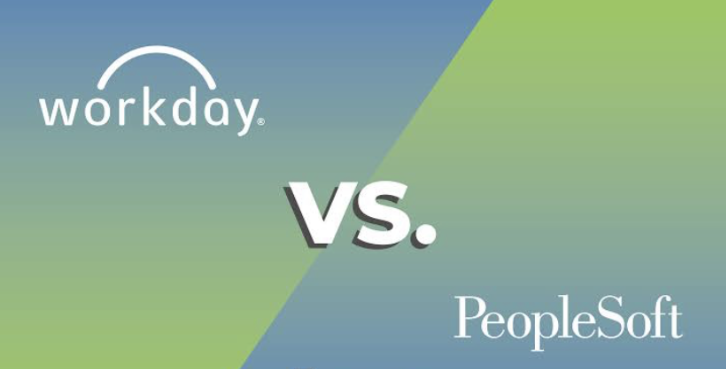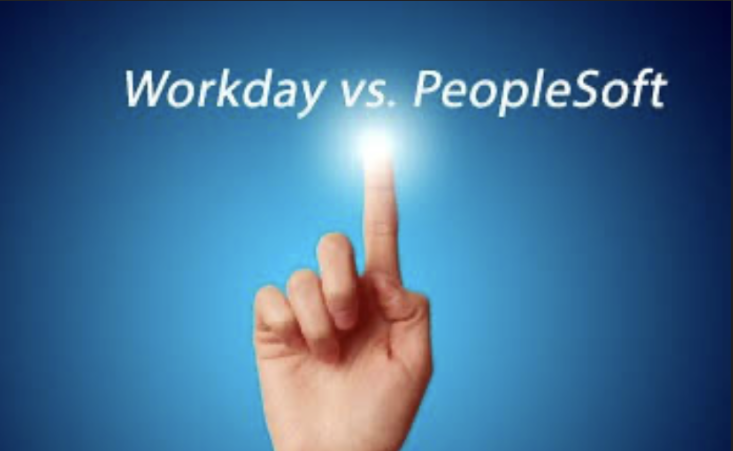
Workday vs Peoplesoft
The HR software industry is quite competitive, with thousands of companies vying for customers’ business. In the fierce competition for control of your extensive and intricate HR software, Workday and PeopleSoft are at one other’s throats. Learn more about it with Workday training.
Tech tycoon David Duffield co-founded PeopleSoft and Workday. Both businesses are still vying for a bigger share of the market for enterprise resource planning (ERP) in 2022, and they’re both using machine learning and artificial intelligence to improve and speed up their offerings.
Both options provide businesses with reliable, worldwide, horizontal HR plus ERP system solutions, and they have devoted customer bases. Despite this, they are all distinct from one another in their own special ways.
Table of Contents
- What Makes Workday the Best Option?
- What Makes PeopleSoft the Best Option?
- Comparison Between PeopleSoft & Workday
- Which Is Better: Workday or PeopleSoft?
Which Is Better: Workday or PeopleSoft?
Organizations and businesses may take advantage of cloud-based human resource management options with Workday Human Capital Management (HCM), a product from the industry-leading HR software provider Workday.
Among the many functions included in Workday’s human capital management software are those for handling payrolls, shift organizing, time tracking, as well as compensation. Because of this, HR managers can keep track of all their workforce management activities in one place.
Users may apply intelligent automation to decrease manual activities and improve their staff’s efficiency. The software also uses augmented person analytics to provide insights from datasets.
With Workday, you get more than just the HCM solution when it pertains to HR features. Enterprise performance management (EPM) software from Workday, Adaptive Planning, is available in the cloud and helps users with financial, labor, operational, as well as marketing planning. Businesses can also benefit from the solution’s assistance with fundamental accounting operations with Workday Financial Management.
Interested in a Workday Certification course? Register now for Workday Training in Hyderabad offered by ‘Mindmajix – A Global training platform’.
Which Is Better: Workday or PeopleSoft?

Oracle Software PeopleSoft is among the most cutting-edge and all-encompassing suppliers of company software on the planet thanks to its emphasis on integrated systems as well as the support of a worldwide leader in corporate technology.
In response to the meteoric rise of cloud computing, PeopleSoft has recently shifted its business model to be cloud-based. The software is compatible with every cloud storage system, either private or public, although PeopleSoft suggests administrators configure it for running on Oracle Cloud so purchasers may connect their existing PeopleSoft systems with Oracle’s cloud offerings.
Many benefits are available to PeopleSoft customers that employ this unique storage solution. The PeopleSoft Cloud Manager tools, that handle updates as well as data connections, are only available with this cloud storage option. This is the most significant fact.
Oracle develops new versions of PeopleSoft every quarter, so the business is always adding additional functions to its software solutions. For even more feature management, Oracle PeopleSoft offers the Cumulative Feature Overview (CFO) tool, which lets customers compile a report detailing all the features added to PeopleSoft throughout the years.
With PeopleSoft’s Human Capital Management software, users may automate additional processes to simplify talent management and cut operating expenses. However, because Oracle HCM Cloud offers an entire solution for PeopleSoft users, Oracle facilitates the migration of customers from PeopleSoft to Oracle Cloud.
Read: Who Benefits the Most from ERP Software Integration?
Which Is Better: Workday or PeopleSoft?
The advantages and disadvantages of upgrading company software should be carefully considered by anyone making such a decision. When thinking about your next upgrade, you can come to a crossroads if implementing an innovative software solution is really vast and complicated.
But how distinct are PeopleSoft & Workday, the two systems at odds with one another?
Both suppliers offer large enterprises a number of features and suites that help with HR and talent management, albeit the nomenclature may differ. However, there are a handful of PeopleSoft-only features and a number of hidden internal distinctions that aren’t immediately apparent.
- Customer relationship Management (CRM)
Oracle provides a suite of customer relationship management solutions called PeopleSoft CRM. Its customer relationship management system is adaptable to the needs of businesses in the service, marketing, or sales sectors and works in tandem across the rest of PeopleSoft’s platform.
Users can automate operations, set up workflows, and generate orders with the help of business process management (BPM) solutions that are accessible within the CRM.
At this time, a native CRM app is not available for Workday. Rather, they have joined forces with Salesforce, the market leader in the use of cloud computing. Consequently, the two businesses are able to work together seamlessly thanks to the Salesforce Service Cloud.
- Upgrades and deployment
The availability of many options for deployment is a key differentiator between PeopleSoft & Workday.
By design, Workday is cloud-deployable, so users always have the most recent version thanks to automatic feature releases. The fact that Workday doesn’t necessitate any kind of infrastructure or hardware on-premises also means that there’s a chance for a reduced overall cost of ownership.
Workday has made investments in software alliances to extend its native integration options, which is a huge plus. This means that you can easily link their services with Slack, Salesforce, and numerous other essential business applications without involving IT.
PeopleSoft is not only available for purchase as an on-premises or private cloud solution, but it also offers cloud deployment. System administrators are able to download updated versions of the applications from PeopleSoft on an ongoing basis, choose which updates to run, as well as schedule maintenance at their convenience. The tool has shifted to a Selective Adoption approach for updates.
A number of options for integration are also available in the PeopleSoft Applications Portal. One of these is with Microsoft Exchange Server. Although administrators have more control throughout the maintenance as well as update schedule with the Selective Adoption model, it needs more involvement compared to the constantly-updated Workday if it pertains to PeopleSoft updates.
Because there are so many different deployment choices, the topic of configuration and customization usually comes up in conversation. As a result, these businesses will not consider a SaaS solution unless it allows for extensive customization, since they assume that this is impossible with pure SaaS.
Consider the company’s IT as well as specialized support staff accessibility when comparing Workday versus PeopleSoft deployments. While those who can afford specialized PeopleSoft assistance will come across the product customisation to be worthwhile, individuals on a tighter budget might discover that Workday’s native integration options and continuous upgrades are more to their liking.
- User Interface
Workday stands apart due to its user-friendly layout. Built on current architecture, Workday offers a web-based user interface for consumers.
In an effort to unify the user experience across desktop, smartphone, and mobile devices, the company is constantly innovating. The user interface can evolve to meet customer demands and new styles without affecting the product’s essential features. This implies that your workflow is unaffected by UI modifications.
Workday offers a user-friendly interface for academic institutions, in contrast to Peoplesoft’s HR solutions, which offer more self-service options for employees. Connected to Workday’s financial and human resources systems, the Workday Student platform provides a solution for student information management. One of PeopleSoft’s products, PeopleSoft Campus Solutions, is a database management system for student records.
- Reporting and analytics
More and more organizations are incorporating dashboard analytics and reporting into their products as the usability of business intelligence tools improves. Although tools for analytics and reporting are available in both PeopleSoft and Workday, the two businesses have taken various approaches to integrating these elements.
Users now have the availability of analytics data regardless of how they are working inside PeopleSoft, thanks to PeopleSoft’s efforts to integrate analytics into all of its tools. These tools can only analyze data that is already in the organization’s PeopleSoft databases. One example is PeopleSoft financials, which uses data acquired from users’ linked PeopleSoft databases to deliver analytics and reporting services.
In contrast, the Prism Analytics features in Workday allow users to integrate third-party data sources & generate analytical reports directly from within the platform. Adding external data transforms the feature into a business intelligence tool, while these tools are already present across the program to provide insights directly into the dashboards.
Which Is Better: Workday or PeopleSoft?
Workday is a cutting-edge platform that accommodates today’s workforce and uses technology that is in sync with what’s happening in the IT industry. Workday’s history as an HCM solution gives HR experts a system that prioritizes the workforce as well as finances. With its consistent updates and enterprise-level focus, Workday HCM is a great option for many different types of businesses.
Contrarily, PeopleSoft HCM is “designed to handle the most intricate business needs.” Although this makes it the market leader in terms of end-to-end capabilities as well as presence, it can additionally make installations exceedingly complex.
Oracle, meantime, is pushing towards cloud functionality and adaptability, even as many companies switch to Workday. Users now have better, easier access to their data regardless of their location, and administrators have more say over when updates occur.